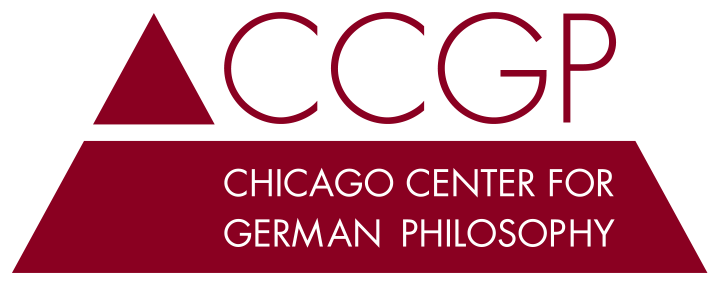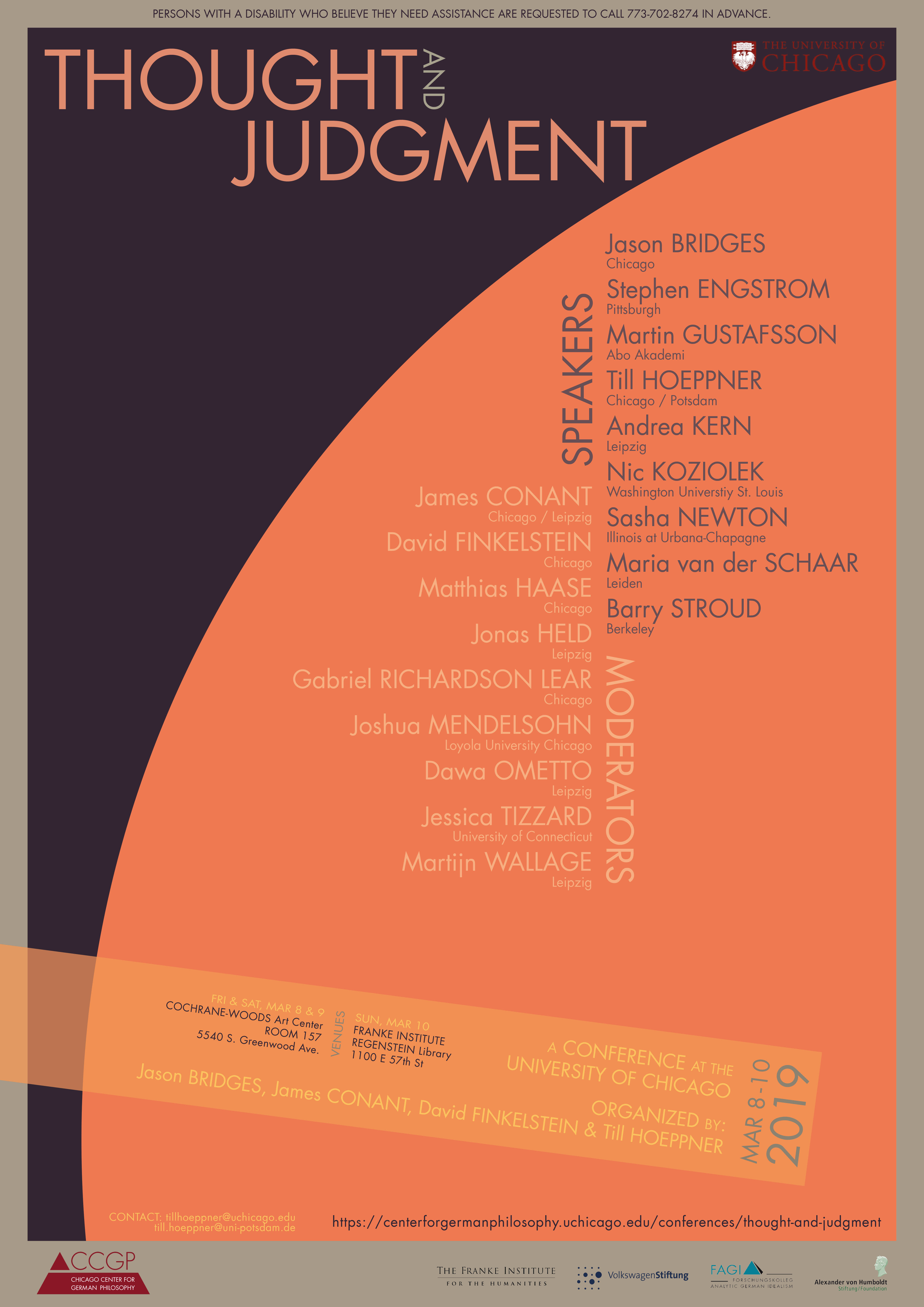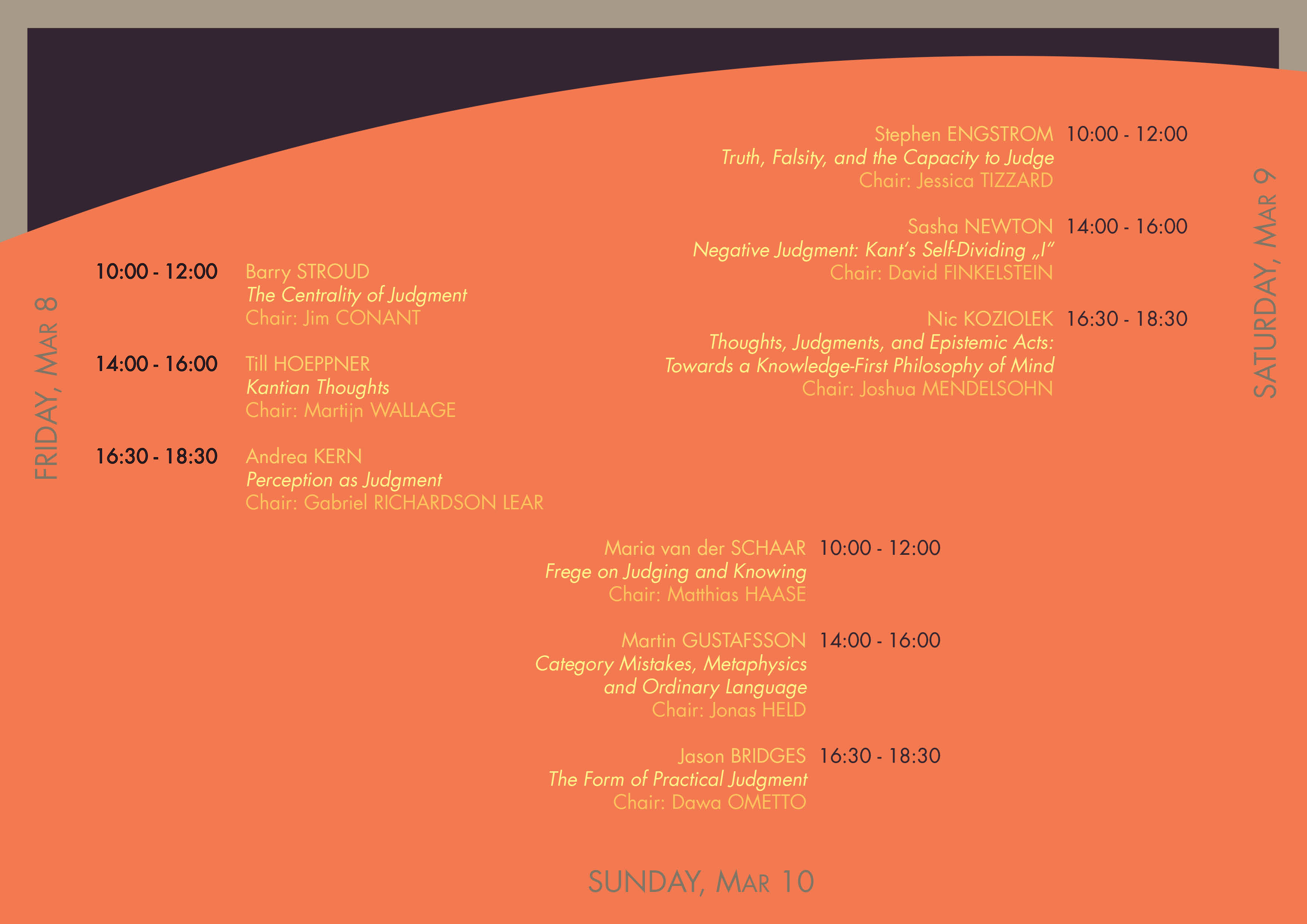Thought and Judgment
A Conference at the University of ChicagoMarch 8th to 10th, 2019
In recent decades, various philosophers have proposed to adopt a Kantian starting point when attempting to understand our relation to reality in metaphysics, epistemology and philosophy of mind. They suggest, namely, to follow Kant by proceeding in philosophical inquiry from an investigation of the requirements on objective thought and judgment.
A prominent example of such an approach is the work of John McDowell, in his Mind and World (Harvard 1996, cf. 11f., 27ff.) and Having the World in View (Harvard 2009, cf. 5f., 141ff.), who begins with and then employs a notion of reality and its constituents as what can be judged or thought, in particular by developing its consequences for a notion of perceptual experience.
Another important example is Barry Stroud. In recent work, as collected in his new volume Seeing, Knowing, Understanding (Oxford 2018, especially in essays 6, 7, 8), he has suggested to follow Kant in his reversal of the way traditional analytic epistemology and philosophy of mind proceeds. That tradition tends to start from the bottom up with some more or less restrictive conception of perceptual experience, which is as of yet non-committal with respect to reality, and to be supplemented with some additional non-sensory resources to give us knowledge of the world. This bottom up procedure, or so Stroud has argued, inevitably leads us into skepticism. Instead, he proposes, one should start from the top down, namely with a conception of thought and judgment, in order to arrive at a conception of perceptual experience and reality that is able to fulfill the conditions of thought and judgment.
In our workshop, we want to explore what is involved in following such an approach of first of all giving an account of thought and judgment, as suggested in various ways by McDowell, Stroud and others.
Some of the possible questions that could occupy us are the following: Why should an investigation of the way in which we relate to reality proceed from an understanding of thought and judgment? And if we do proceed in that manner, what exactly are we proceeding from: what is the nature of thought, what the nature of judgment? How are they related to each other, and how do accounts of them relate? Can one be accounted for in terms of the other, or do they need separate treatments? How should we understand essential features of thought and/or judgment like their propositional unity, i.e. their purporting to be true or false, or their identity through particular acts of thinking them, i.e. their repeatability and shareability? Are there specific concepts any subject that is able to think propositional thoughts about an objective reality must possess and employ, e.g. is the concept of causation such a concept? How are thought and judgment related to our perceptual experience in virtue of which we get in touch with reality, and how does an account of thought and judgment relate to an account of perceptual experience? Does a procedure that gives priority to thought and judgment, e.g. as expressed in the (Tractarian) notion of the world as everything that is the case, involve a commitment to some form of idealism, as was suggested by McDowell (cf. Having the World in View, 141ff.) but denied by Stroud (cf. Seeing, Knowing, Understanding, 97ff.)?
No registration is required. The conference is not read ahead.
PERSONS WITH A DISABILITY WHO BELIEVE THEY NEED ASSISTANCE ARE REQUESTED TO CALL 773-702-8274 IN ADVANCE.
Dates:
March 8-10, 2019
Location:
On March 8 & 9: Cochrane-Woods Art Center, Room 157, 5540 S Greenwood Ave
On March 10: Franke Institute for the Humanities, at the east entrance of the Regenstein library, 1100 East 57th Street
Program
Friday, March 8th
10:00 am – 12:00 pm
The Centrality of Judgment
Barry Stroud (Berkeley)
Barry Stroud (Berkeley)
Moderator: James Conant (Chicago)
2:00 pm – 4:00 pm
Kantian Thoughts
Till Hoeppner (Chicago)
Till Hoeppner (Chicago)
Moderator: Martijn Wallage (Leipzig)
4:30 pm – 6:30 pm
Perception as Judgment
Andrea Kern (Leipzig)
Andrea Kern (Leipzig)
Moderator: Gabriel Richardson Lear (Chicago)
Saturday, March 9th
10:00 am – 12:00 pm
Truth, Falsity, and the Capacity to Judge
Stephen Engstrom (Pittsburgh)
Stephen Engstrom (Pittsburgh)
Moderator: Jessica Tizzard (UConn)
2:00 pm – 4:00 pm
Negative Judgment: Kant’s Self-Dividing ‘I’
Alexandra Newton (Illinois, Urbana-Champaign)
Alexandra Newton (Illinois, Urbana-Champaign)
Moderator: David Finkelstein (Chicago)
4:30 pm – 6:30 pm
Thoughts, Judgments, and Epistemic Acts: Towards a Knowledge-First Philosophy of Mind
Nic Koziolek (Washington University, St. Louis)
Nic Koziolek (Washington University, St. Louis)
Moderator: Josh Mendelsohn (Loyola University, Chicago)
Sunday, March 10th
10:00 am – 12:00 pm
Frege on Judging and Knowing
Maria van der Schaar (Leiden)
Maria van der Schaar (Leiden)
Moderator: Matthias Haase (Chicago)
2:00 pm – 4:00 pm
Category Mistakes, Metaphysics and Ordinary Language
Martin Gustafsson (Abo Akademi)
Martin Gustafsson (Abo Akademi)
Moderator: Jonas Held (Leipzig)
4:30 pm – 6:30 pm
The Form of Practical Judgment
Jason Bridges (Chicago)
Jason Bridges (Chicago)
Moderator: Dawa Ometto (Leipzig)


